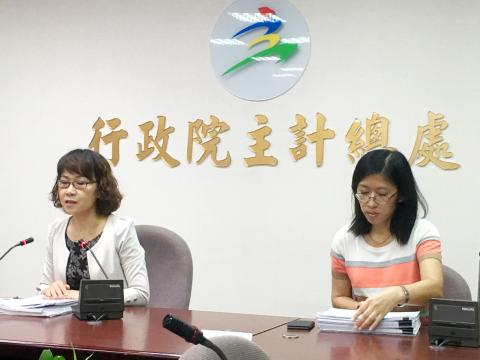After three consecutive quarters of decline, the economy rebounded in the second quarter with year-on-year growth of 0.69 percent, supported by better-than-expected exports, the Directorate-General of Budget, Accounting and Statistics (DGBAS) said yesterday.
The 0.69 percent growth was higher than the 0.48 percent growth the DGBAS forecast in May.
“By the latest data, we could say that the economy is stabilizing slowly. Some local industries showed a positive outlook, such as the electronic components industry,” DGBAS section head Wang Shu-chuan (王淑娟) told a news conference.

Photo: Cheng Chi-fang, Taipei Times
Exports of electronic goods increased by 1.9 percent year-on-year in the second quarter, ending four quarters of contraction, thanks to a recovery in the semiconductor industry, the statistics agency said in a statement.
A sharp decline in the number of Chinese tourist in the second quarter had no obvious impact on the economy as tourists from other nations, such as Japan and South Korea, filled the gap, Wang said.
After price adjustments, real exports, including exported services and goods, increased by 0.65 percent in the second quarter, better than the agency’s 0.29 percent growth forecast, DGBAS data showed.
Private consumption in the second quarter rose 1.05 percent year-on-year, led by a 4.71 percent increase in new car purchases on the back of government subsidies.
However, capital formation — the net additions of equipment, buildings and other intermediate goods — declined 3.11 percent last quarter from the previous year, as the appreciation of the yen dragged down local capital formation, Wang said.
Nearly one-third of the nation’s machinery is imported from Japan, she added.
By sector, GDP growth in the second quarter was led by the output of financial and insurance companies, which climbed 1.6 percent from a year earlier, while manufacturing sector remained sluggish on muted demand with output falling 0.12 percent year-on-year, the smallest decline in five quarters, according to DGBAS.
The second quarter’s mild economic growth has not changed the agency’s full-year GDP estimate of 1.06 percent, Wang said.
In the first half of this year, GDP increased slightly by 0.01 percent from the previous year and the economy might remain weak in the second half due to various macroeconomic uncertainties including terrorist attacks, Brexit impacts and the rise of protectionism, Wang said.

Seventy percent of middle and elementary schools now conduct English classes entirely in English, the Ministry of Education said, as it encourages schools nationwide to adopt this practice Minister of Education (MOE) Cheng Ying-yao (鄭英耀) is scheduled to present a report on the government’s bilingual education policy to the Legislative Yuan’s Education and Culture Committee today. The report would outline strategies aimed at expanding access to education, reducing regional disparities and improving talent cultivation. Implementation of bilingual education policies has varied across local governments, occasionally drawing public criticism. For example, some schools have required teachers of non-English subjects to pass English proficiency

‘FORM OF PROTEST’: The German Institute Taipei said it was ‘shocked’ to see Nazi symbolism used in connection with political aims as it condemned the incident Sung Chien-liang (宋建樑), who led efforts to recall Democratic Progressive Party (DPP) Legislator Lee Kun-cheng (李坤城), was released on bail of NT$80,000 yesterday amid an outcry over a Nazi armband he wore to questioning the night before. Sung arrived at the New Taipei City District Prosecutors’ Office for questioning in a recall petition forgery case on Tuesday night wearing a red armband bearing a swastika, carrying a copy of Adolf Hitler’s Mein Kampf and giving a Nazi salute. Sung left the building at 1:15am without the armband and apparently covering the book with a coat. This is a serious international scandal and Chinese

TRADE: The premier pledged safeguards on ‘Made in Taiwan’ labeling, anti-dumping measures and stricter export controls to strengthen its position in trade talks Products labeled “made in Taiwan” must be genuinely made in Taiwan, Premier Cho Jung-tai (卓榮泰) said yesterday, vowing to enforce strict safeguards against “origin laundering” and initiate anti-dumping investigations to prevent China dumping its products in Taiwan. Cho made the remarks in a discussion session with representatives from industries in Kaohsiung. In response to the US government’s recent announcement of “reciprocal” tariffs on its trading partners, President William Lai (賴清德) and Cho last week began a series of consultations with industry leaders nationwide to gather feedback and address concerns. Taiwanese and US officials held a videoconference on Friday evening to discuss the

PERSONAL DATA: The implicated KMT members allegedly compiled their petitions by copying names from party lists without the consent of the people concerned Judicial authorities searched six locations yesterday and questioned six people, including one elderly Chinese Nationalist Party (KMT) member and five KMT Youth League associates, about alleged signature forgery and fraud relating to their recall efforts against two Democratic Progressive Party (DPP) legislators. After launching a probe into alleged signature forgery and related fraud in the KMT’s recall effort, prosecutors received a number of complaints, including about one petition that had 1,748 signatures of voters whose family members said they had already passed away, and also voters who said they did not approve the use of their name, Taipei Deputy Chief Prosecutor